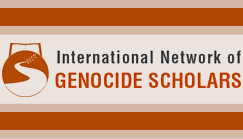
Panel 3 (rescheduled) - Political Ideologies and Political Identities in Post-Atrocity Transitions
Start Date
3-10-2020 10:45 AM
End Date
3-10-2020 12:15 PM
Submission Type
Panel
Abstract
A focus on ideological fanaticism and long-standing hatreds between identity-groups dominates media depictions of genocides, crimes against humanity and other atrocities, yet is widely rejected in academic scholarship. In recent years, however, scholars have increasingly offered more nuanced perspectives on political ideologies and identities, that emphasise the important but multifaceted ways in which they can promote atrocity-perpetration. Considerably less studied, however, is the role that political ideologies and identities developed before and during conflict play in the post-atrocity transition. As such, this panels aims to approach following overarching question: How do political ideologies and political identities affect the trajectories of post-atrocity transitions? As such, this panel seeks to incorporate a temporal dimension to the topic of political ideologies and identities in post-atrocity transitions, taking under scrutiny not just the transitions themselves, but the trajectories they have taken out of the violence itself and how the ideologies and identities transform themselves, remain the same or are replaced within this context and what implications this has. This panel will thus contribute to a number of key current literatures in social scientific research on ideas, identity and conflict. First, the panel will contribute to the rapid recent growth of research on political ideology, especially concerning the still understudied dynamics of ideological change. Second, the panel will make similar contributions to the extensive literature on identity, conflict and post-conflict reconstruction, particularly speaking to recent research on the way in which identities evolve during conflict, as fluid identity categories are activated, mobilised, and radicalised under conditions of crisis and threat. Third, the panel will contribute to the burgeoning literature on post-atrocity transitional justice, augmenting it by this explicit perspective on ideologies and identities. Fourth, and finally, the panel will contribute to the memory turn in political science research, highlighting the contentious nature of post-atrocity memory politics, particularly showing how identities are manipulated for political gain, drawing on various extant and (re-)created political identities.
Presentations
Timothy Williams: Ambivalence and Mnemonic Role Attributions in the Politics of Memory in Post-Genocide Cambodia and Rwanda
Jonathan Leader Maynard: Social Scientific Research on Ideological and Identity Change in Mass Atrocities
Willa Witherow-Culpepper: Who Is He When He's At Home
Panel 3 (rescheduled) - Political Ideologies and Political Identities in Post-Atrocity Transitions
A focus on ideological fanaticism and long-standing hatreds between identity-groups dominates media depictions of genocides, crimes against humanity and other atrocities, yet is widely rejected in academic scholarship. In recent years, however, scholars have increasingly offered more nuanced perspectives on political ideologies and identities, that emphasise the important but multifaceted ways in which they can promote atrocity-perpetration. Considerably less studied, however, is the role that political ideologies and identities developed before and during conflict play in the post-atrocity transition. As such, this panels aims to approach following overarching question: How do political ideologies and political identities affect the trajectories of post-atrocity transitions? As such, this panel seeks to incorporate a temporal dimension to the topic of political ideologies and identities in post-atrocity transitions, taking under scrutiny not just the transitions themselves, but the trajectories they have taken out of the violence itself and how the ideologies and identities transform themselves, remain the same or are replaced within this context and what implications this has. This panel will thus contribute to a number of key current literatures in social scientific research on ideas, identity and conflict. First, the panel will contribute to the rapid recent growth of research on political ideology, especially concerning the still understudied dynamics of ideological change. Second, the panel will make similar contributions to the extensive literature on identity, conflict and post-conflict reconstruction, particularly speaking to recent research on the way in which identities evolve during conflict, as fluid identity categories are activated, mobilised, and radicalised under conditions of crisis and threat. Third, the panel will contribute to the burgeoning literature on post-atrocity transitional justice, augmenting it by this explicit perspective on ideologies and identities. Fourth, and finally, the panel will contribute to the memory turn in political science research, highlighting the contentious nature of post-atrocity memory politics, particularly showing how identities are manipulated for political gain, drawing on various extant and (re-)created political identities.



